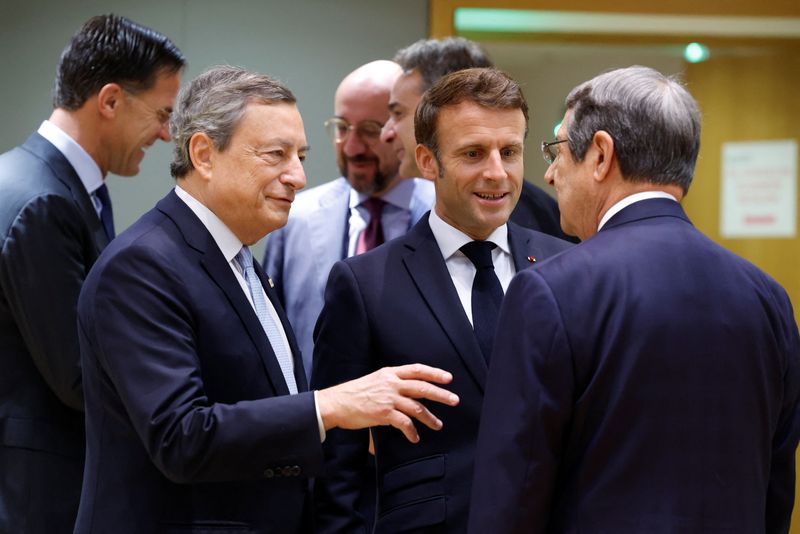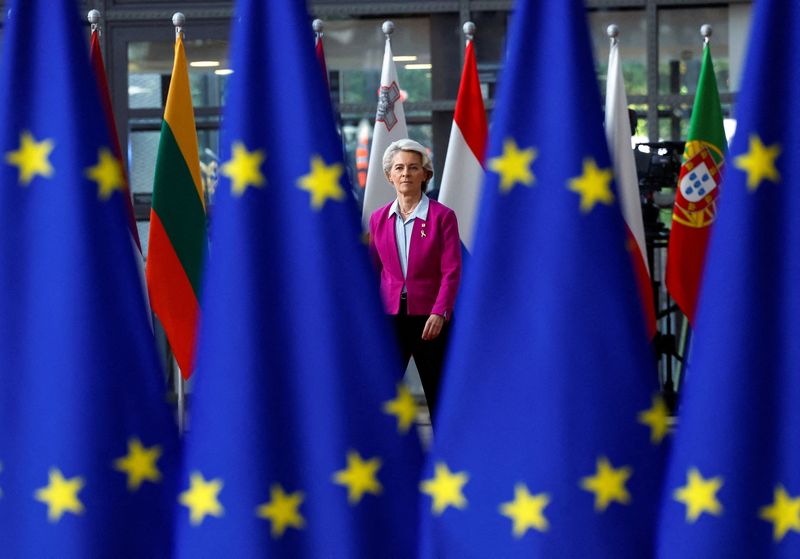By Gabriela Baczynska and Marine Strauss
BRUSSELS (Reuters) -The European Union will give Kyiv 1.5 billion euros a month in 2023 to help run Ukraine as it fights back Russia's invading troops, the head of the bloc's executive said on Friday.
European Commission President Ursula von der Leyen spoke after the 27 national EU leaders discussed supporting Ukraine during a second day of their summit in Brussels on Friday, the 240th day of Russia's war on its neighbour.
She said that the EU has so far given Ukraine 19 billion euros this year but that the summit looked at 2023.
"It is very important for Ukraine to have a predictable and stable flow of income," she said, adding that Kyiv estimated its monthly needs at 3-4 billion euros "for the basics".
Sporting a lapel pin in Ukraine's yellow and blue, von der Leyen told a news conference the EU would finance 1.5 billion euros per month of that, with the rest expected to come from the United States and international institutions.
"That will give a total of 18 billion for the next year - an amount Ukraine can count on and where there is a stable and reliable, predictable flow of income."
"PURE TERRORISM"
Ukrainian President Volodymyr Zelenskiy addressed the EU leaders via a video link the day earlier, saying Russian missiles and Iranian drones have damaged a third of Ukraine's energy infrastructure as winter approaches.
"Russia also provokes a new wave of migration of Ukrainians to EU countries," Zelenskiy said.
"Russian terror against our energy facilities is aimed at creating as many problems as possible with electricity and heat for Ukraine this fall and winter so that as many Ukrainians as possible move to your countries."
Von der Leyen said the EU was also looking at how to help Ukraine re-establish water, power and electricity supplies.
Zelenskiy asked the EU for air and missile defence systems, as well as "new powerful" sanctions on Russia as well as on Iran for supplying drones for use in Moscow's war.
The bloc has already imposed limited sanctions on Iran over that, but EU member states are divided over slapping any more sanctions on Russia now.
Poland and the three Baltic states proposed banning Russian diamond imports from Russia and phasing out steel trade more quickly, but Belgium and Italy are among those opposed to these steps.
Hungary is against sanctioning Russia in general, while Germany and France have said current measures already go far.
Zelenskiy urged the West to warn Russia not to blow up a huge dam that could flood large areas of southern Ukraine, and he appealed for more aid pledges to be made at an international conference in Berlin next Tuesday dedicated to Ukraine's reconstruction.
The summit's chairman, European Council President Charles Michel, said the EU was looking at using Russian assets frozen under sanctions against Moscow towards rebuilding Ukraine.
Estonian Prime Minister Kaja Kallas said that amounted to some 300 billion euros, though Berlin and others have warned that actually seizing the assets might be illegal.

Kallas also sided with Lithuania in pushing for a special international tribunal to be set up to judge possible war crimes committed in Ukraine, something the Netherlands has voiced caution about.
"This is pure terrorism," Kallas said of Russia's war.
